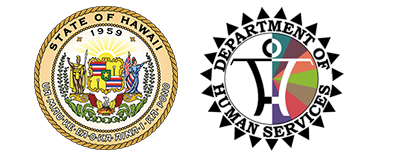Foster and Adoptive Care
The Department of Human Services & its Community Partners
Honor and Support Resource and Adoptive Families
The Mission
Permanency by keeping children at home with their families safely (prevent removal), reunification, relative placement and maintaining safe and appropriate birth family connections.
2020: A Healing Journey: The Road to Reunification
2019: Hikalea Family
2018: Estrella Barnett
2016: Soares Family
2015: Ganon Family
2014: Kim Seu Family
2013: U’u Family
WARM LINE SUPPORT LINE FOR RESOURCE CAREGIVERS IS NOW OPEN 7 DAYS A WEEK, 8:30AM-10:00PM. Oahu (808)545-1130/Neighbor Islands 1-866-545-0882 (Toll-free). WE ARE HERE TO SUPPORT YOU!
“Answering the Call – You don’t have to be perfect to be a perfect parent. There are thousands of teens in foster care who would love to put up with you.” To learn more about Foster Care in Hawaii visit https://rcg.hawaii.gov.
Frequently Asked Questions
1. What process does DHS follow in approving resource families?
The approval process requires the social worker to:
-
- Conduct child abuse and neglect checks and criminal history clearances on all adult household members
- Conduct a home visit
- Obtain references on the prospective resource caregivers
- Obtain medical reports for the prospective resource caregivers and TB clearances for all adult household members
- Obtain a copy of a marriage certificate, if applicable, for the prospective resource families
- Obtain financial information and employment history for the prospective resource families
2. What criminal or child abuse history would disqualify a person from being a resource caregiver?
The Department of Human Services adheres to the Federal Law which prohibits the licensing of a resource caregiver/home if:
-
- At any time, there has been a felony conviction for child abuse and neglect; spousal abuse; a crime against a child or children, including child pornography; or a crime involving violence, including rape, sexual assault, or homicide, but not including other physical assault or battery.
- If within the last five years, there has been a felony conviction for physical assault, battery or a drug related offense.
Other situations of confirmed child abuse and neglect cases and other criminal convictions would need to be assessed if they pose a risk to children in care.
3. Do prospective resource families receive any training?
Yes, applicants are required to attend an 15-hour pre-service training, called HANAI. Catholic Charities Hawai’i is contracted by the Department to provide the training.
Ongoing Training Requirements & Resources for Resource Caregivers:
- Coronavirus Disease
- 2013 Letter regarding Ongoing Training Requirements
- Resource Caregiver Training Verification
- Hawaii Caregivers and the Court Guide
- Resource Family Basics – Helpful Information
- Resource Family Basics – (Chuukese)
- Resource Family Basics – (Ilocano)
- Resource Family Basics- (Marshallese)
- Resource Family Basics- (Tagalog)
- Enhancement Fund Available in Hawaii
4. What are the Reasonable and Prudent Parent Standards for resource caregivers and child-caring institutions?
We have compiled a guide for resource caregivers and child-caring institutions that you can access here.
5. How can resource caregivers and child-caring institutions promote normalcy and well-being in children and young people in foster care?
We created a question and answer guide for resource caregivers and child-caring institutions to better understand what measures help promote normalcy and well-being.
Resources for Resource and Adoptive Families
NEWSLETTERS: Hui Ho’omalu Statewide Resource Advisory Committee (RAC)
Licensed Agencies in Hawaii

